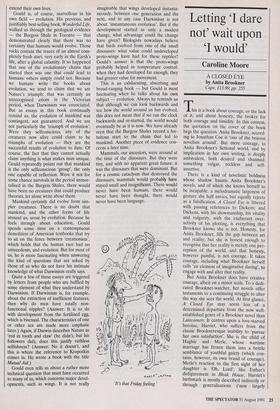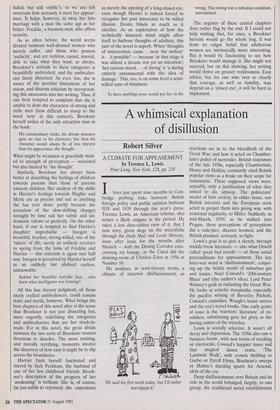Letting 'I dare not' wait upon `I would'
Caroline Moore
A CLOSED EYE by Anita Brookner Cape, £13.99, pp. 255 This is a book about courage, or the lack of it, and about honesty, the broker for both courage and timidity. In this context, the quotation on the cover of the book begs the question. Anita Brookner, accord- ing to Jonathan Coe is 'one of the bravest novelists around'. But mere courage, in Anita Brookner's fictional world, and by implication in her own writing, is deeply ambivalent, both desired and shunned: something vulgar, reckless and self- assertive.
There is a kind of novelistic boldness whose shadow haunts Anita Brookner's novels, and of which she knows herself to be incapable: a melodramatic largeness of gesture she half envies, but equally rejects as a falsification. A Closed Eye is littered with passing references to Dickens; and Dickens, with his showmanship, his vitality and vulgarity, with the exuberant over- activity of his plotting, is everything that Brookner knows she is not. Honesty, for Anita Brookner, fills the gap between art and reality; but she is honest enough to recognise that her reality is merely one per- ception of the world, and that honesty, however painful, is not courage. It takes courage, including what Brookner herself calls 'an element of imaginative daring', to engage with and alter that reality.
But Anita Brookner does have creative courage, albeit on a minor scale. To a dedi- cated Brookner-watcher, her novels offer testaments to a continuing struggle to alter the way she sees the world. At first glance, A Closed Eye may seem less, of a determined departure from the now well- established genre of a Brookner novel than Latecomers. It centres upon a love-starved heroine, Harriet, who suffers from the classic Brookneresque inability to 'pursue her own satisfaction'. She is the child of Hughie and Merle, whose wartime marriage has frozen them into a brittle semblance of youthful gaiety (which con- tains, however, its own brand of courage). Merle's reaction to the first sight of her daughter is 'Oh, Lord'; like Esther's disfigurement in Bleak House, Harriet's birthmark is mostly described indirectly or through generalisations ('now largely
faded, but still visible'), so we are left uncertain how seriously it mars her appear- ance. It helps, however, to sway her into marriage with a man the same age as her father: Freddie, a business man, who offers security.
As so often before, the world seems divided between well-dressed women who merely suffer, and those who possess `audacity', and are reckless, casual, amoral, able to take what they want; as always, Brookner's attitude to these categories is beautifully ambivalent, and the ambivalen- cies finely dissected. As ever, too, she is aware of the peculiar limitations of her vision, and disarms criticism by incorporat- ing this awareness into her writing. Thus, if one feels tempted to complain that she is unable to draw the characters of strong and virile men (how difficult to stoop to the word 'sexy' in this context), Brookner herself writes of the only attractive man in the book:
His extraordinary looks, his abrupt manners gave no clue to his character, but then his character would always be of less interest than his appearance, she thought.
What might be weakness is gracefully twist- ed to strength of perception — sustained but also limited by 'she thought'.
Similarly, Brookner has always been better at describing the feelings of children towards parents than those of parents towards children. Her analysis of the shifts in Harriet's feelings towards Hughie and Merle are as precise and sad as anything she has ever done: partly because the evocation of the slow-drifting changes wrought by time suit her subtle and un- dramatic talents so perfectly. On the other hand, if one is tempted to find Harriet's daughter improbable — Imogen is beautiful, fearless, strong-willed, one of the `takers' of life; surely an unlikely creature to spring from the loins of Freddie and Harriet — this criticism is again met half way. Imogen is perceived by Harriet herself as an unlikely but idolised cuckoo, unknowable.
Behind her beautiful nun-like face. . . who knew what intelligence was forming?
All this fine literary judgment, all those nicely crafted ambivalences, could remain static and sterile, however. What brings the best chapters of this novel alive is the sense that Brookner is not just dissecting but, more urgently, redefining the categories and ambivalencies that are her stock-in- trade. For in this novel, the great divide between the two sorts of Brookner women threatens to dissolve. The most exciting, and morally terrifying, moments involve the discovery of how easy it might be to slip across the boundaries.
Harriet finds herself fascinated and stirred by Jack Peckham, the husband of one of her few childhood friends. Brook- ner's description of the progress of her `awakening' is brilliant. She is, of course, far too subtle to represent the experience as merely the opening of a long-closed eye, even though Harriet is indeed forced to recognise her past innocence to be willed illusion. Desire blinds as much as it clarifies. As an exploration of how the technically innocent mind might allow itself to harbour thoughts of adultery, this part of the novel is superb. When 'thoughts of insurrection. came. . . near the surface' is it possible? — because 'at that stage it was almost a dream, not yet an intention'; `her curious mood. . . of daring' is 'a daring entirely unconnected with the idea of damage.' This, too, is on some level a semi- willed state of blindness:
To have anything more would put her in the wrong. This wrong was a nebulous condition, unexamined.
The urgency of these central chapters does rather flag by the end. If I could not help wishing that, for once, a Brookner heroine would go the whole hog, it was from no vulgar belief that adulterous women are intrinsically more interesting. But it would be fascinating to see how Brookner would manage it. She might not succeed, but on this showing, her writing would thrive on greater recklessness. Easy advice; but for one who sees so clearly that courage, as well as timidity, may depend on a 'closed eye', it will be hard to implement.











































 Previous page
Previous page